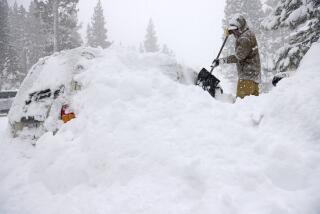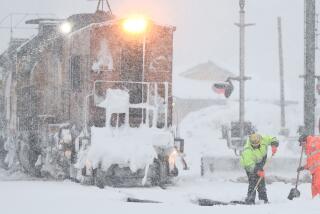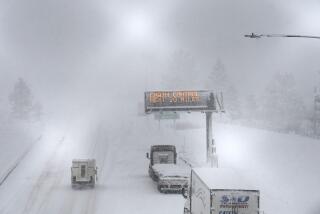Alaska avalanche cuts off highway to Valdez; townsfolk unfazed
With an estimated 50 feet of snow blocking the only highway into town, the 4,000 residents of Valdez, Alaska, will be cut off indefinitely, officials say, leaving access only by air or by sea.
As many as a dozen avalanches came down on the 360-mile Richardson Highway to Fairbanks on Friday, officials said, including one that dammed a river and created a lake up to half a mile long across the road. The highway cannot be cleared until water behind the snow drains, state transportation officials say.
“At this time, there is no safe way to approach relieving that water,” Jason Sakalaskas, a maintenance engineer, said at a news teleconference Monday, according to the Associated Press.
The avalanches came in an area known locally as Snow Slide Path, said Mike Coffey, another maintenance engineer for the Alaska Department of Transportation & Public Facilities. He estimated that snow is 50 feet high on the highway.
But most residents of Valdez, terminus for the trans-Alaska pipeline, seem to be taking the situation in stride.
“You’ve got to understand, half of the towns of Alaska don’t have roads that lead into them, and they do OK,” Jody Wellcomes, a customer service representative at Safeway, told the Los Angeles Times. “Alaskans do survive without driving.”
After the avalanches, Wellcomes said, she had a steady flow of customers at the store, which she calls “the Valdez mall” -- because it’s not just the largest grocer in town, it’s also the largest place to shop.
“There are some people who do freak out and say, ‘We have to load up on groceries.’ … They are going to hoard bread, eggs and milk,” she said. “But I don’t freak out. We’ve got boats. We’ve got airplanes.”
Instead of trucking in food, the grocery store is ferrying it in.
And some cashiers must work extra shifts because fellow employees are stuck in Anchorage, about 300 miles away, Wellcomes said.
The mail is being flown in, the Associated Press reported, and fuel companies expect no shortages. Likewise, the trans-Alaska pipeline is unaffected.
Tony Gorman, news director at radio station KCHU-AM in Valdez, told The Times that although townsfolk are concerned, they are used to extreme weather, including an abundance of snow.
So far this month, Valdez has received 55 inches of snow, Louise Fode, a meteorologist with the National Weather Service in Anchorage, told The Times. The area is known as one of the snowiest in Alaska.
But the area also has received six inches of rain since Jan. 21, which almost certainly made the snowpack more unstable, Fode said. That probably contributed to the avalanches.
Mark Lee, who has lived in Valdez for more than 30 years, told The Times that he’d never seen avalanches that big come down in Thompson Pass and block off the road.
Still, Lee said, some sort of weather — ice or snow — seems to block the highway to town nearly every other year. Most people are used to it, said Lee, who owns the Pipeline Club, a restaurant, bar and motel.
Some of his supplies — such as toilet paper, hand towels and soap — probably will be delayed for a few days, he said. Perhaps they’ll have to bring them in by barge.
But Lee isn’t worried about the real necessities in his business: beer and other libations. He always stashes away a few weeks’ supply. “Just in case something like this happens,” he said.
Twitter: @thecindycarcamo
More to Read
Start your day right
Sign up for Essential California for news, features and recommendations from the L.A. Times and beyond in your inbox six days a week.
You may occasionally receive promotional content from the Los Angeles Times.







